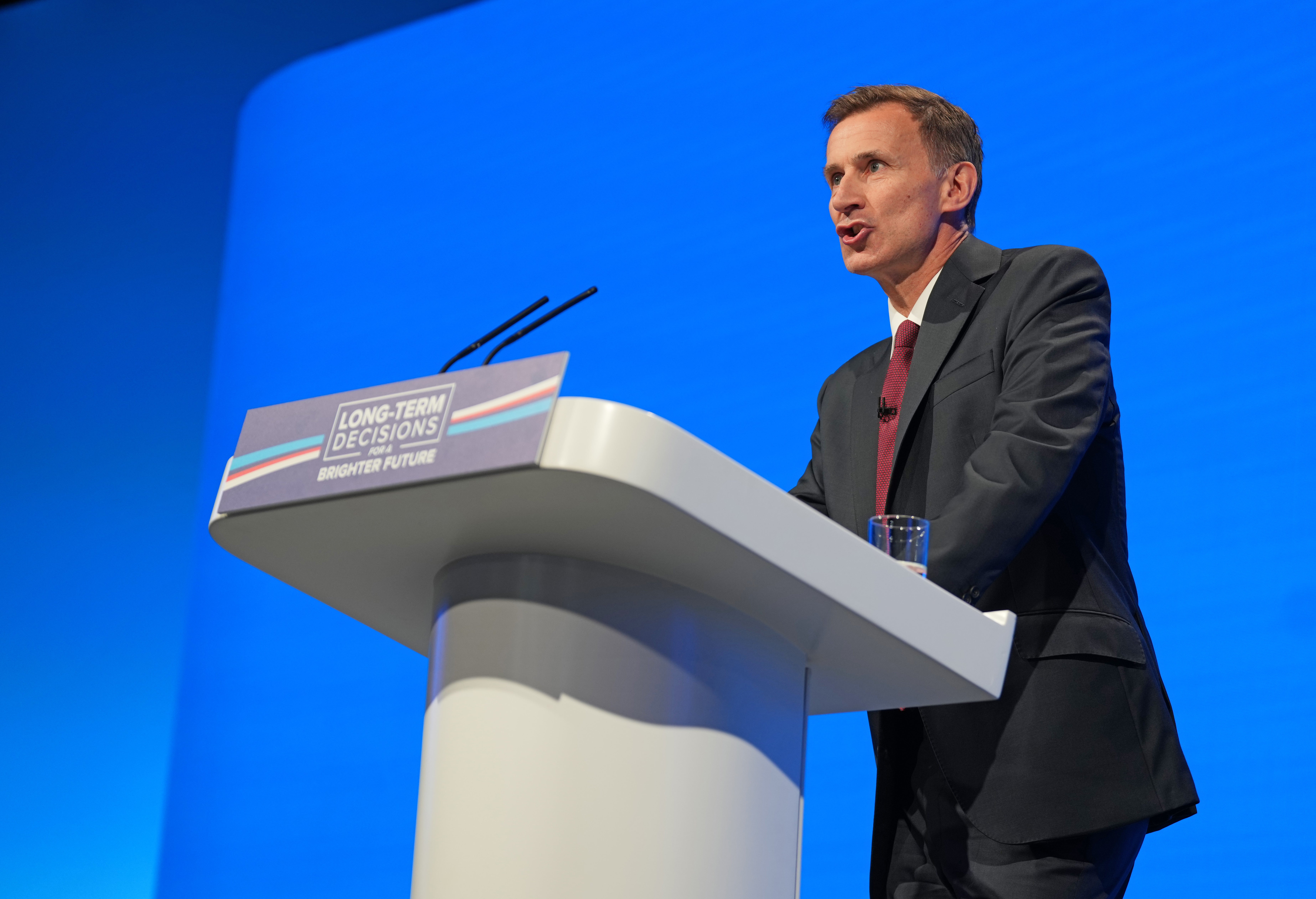Jeremy Hunt’s tax-cut hint won’t appease Tory rebels – or the voters
As Liz Truss packed out the conference crowds with a demand for immediate tax cuts, the chancellor tried to deliver a message of patience. But with the party facing electoral wipeout, there isn’t much of it about, writes Andrew Grice


Jeremy Hunt went into the lions’ den at the Conservative conference, only 90 minutes after a party ravenous for tax cuts had been served up a lunch plate of red meat by Liz Truss, speaking at a packed fringe meeting.
The timing of Truss’s shameless intervention, a year after her mini-Budget imploded on the Monday of last year’s Tory conference, was difficult for the chancellor. This week is a tale of two conferences: the low-key one on the main stage, and the lively debate on the fringes about a party with an identity crisis after so many changes at the top during its 13 years in power.
In a dig at Rishi Sunak, Truss urged the Tories “to make conservative arguments again” and called for corporation tax to be cut to 19 per cent or lower – a bit rich, since Hunt had to put it up to 25 per cent to help clear up the mess she had created.
There is barely disguised fury among Sunak loyalists at Truss’s intervention. “She should butt out,” one said. “She is stirring up unreasonable demands.”
Today, Hunt nodded to the worst-kept secret in politics – that he will cut taxes in his Budget next March – by saying in media interviews that it was not right to reduce them “this year”. But that wasn’t enough for grassroots activists or right-wing MPs. Patience is not a virtue when you are heading for the electoral rocks in a year’s time, a state of mind that dominates a downbeat conference here in Manchester despite efforts by Sunak’s allies to talk up the party’s chances.
The chancellor had to cope with another bit of bad timing – last week’s warning by the Institute for Fiscal Studies (IFS) that Britain is making “a decisive and permanent shift to a higher-tax economy”, and that record tax rises in the past four years will cost the equivalent of £3,500 per household.
“It has gone down like a lead balloon with the membership,” one prominent right-winger told me. “Sunak and Hunt are just accepting the status quo, so public spending and taxes will rise. At best, they are tinkering at the margins.”
You don’t have to try very hard here to find critics of Sunak. “An empty vessel,” grumbled one right-winger. In his conference speech on Wednesday, Sunak needs both to dispel this sense in his party, and to spell out to the country what “the real Rishi” stands for.
Hunt told the conference that the IFS was “wrong”. He accepted that taxes were “too high”, but insisted they could be brought down by improving public sector efficiency, saying: “We need a more productive state, not a bigger state.”
His crowd-pleaser was the old chestnut of curbing the size of the civil service, which employs 66,000 more people than before the pandemic. Hunt announced a freeze on expansion and a return to pre-Covid levels to save £1bn.
The chancellor offered voters a “social contract” based on a “carrot and stick” approach. The “carrot” is the rise in the national living wage, which he announced would increase from £10.42 to at least £11 an hour next April. He cheekily called the living wage “another great Conservative invention”. In fact, it was invented by the Liberal Democrats during the 2010-15 coalition, when Tory ministers used to moan about it, and its origins lie in Labour’s introduction of the national minimum wage in 1999.
Hunt’s “shtick” is that jobless people who do not actively look for work, or fail to accept job offers, risk losing part of their benefit.
A divide between “shirkers and strivers” is one of the Tories’ greatest hits, and it’s no surprise that they are playing it with an election coming and the bill for long-term sickness benefits ballooning. Yet it might not be as great a hit as when George Osborne played it as chancellor. Today, public attitudes towards claimants are more favourable, and the perception that they are undeserving “has reduced substantially since 2010”, according to the British Social Attitudes Survey.
The Tories’ hopes of making welfare another one of their much-vaunted “dividing lines” with Labour might also fall flat. Keir Starmer probably saw this one coming when he appointed the Blairite Liz Kendall as his shadow work and pensions secretary last month.
She is not afraid of tough medicine on welfare, and said today: “Labour believes in responsibility – that those who can work should look for work, and take jobs when they are offered.”
The theme of this conference so far is that the Tories don’t have many new ideas, only old ones. Hunt will doubtless play another favourite Tory tune in his Budget by cutting at least 1p off the 20 per cent basic rate of income tax. But, as with the welfare idea, it might be less of a hit this time. Even if the economic figures are a little more optimistic by the time of the election, many voters won’t feel better off by then.
There’s a risk that the tax cuts will look like a crude pre-election bribe that cannot disguise the inevitable: public-spending pressures will mean that the overall tax burden goes up, rather than down, in the next few years, no matter who is in power.
Join our commenting forum
Join thought-provoking conversations, follow other Independent readers and see their replies
Comments



Bookmark popover
Removed from bookmarks